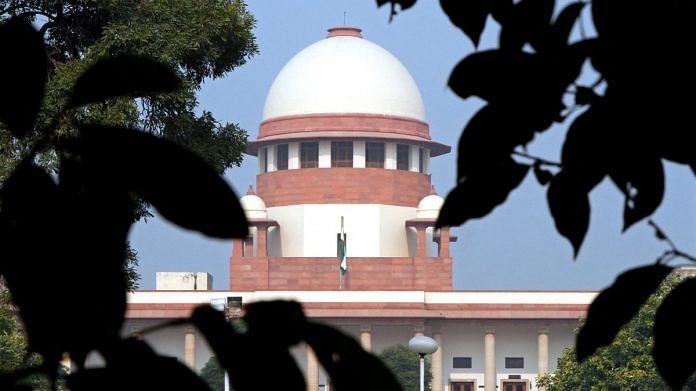New Delhi: Deliberations over the appointment of judges between members of the Supreme Court Collegium (SCC) cannot be shared under the Right to Information Act (RTI) because they are not final decisions, the Supreme Court said Friday.
A bench of justices M.R. Shah and C.T. Ravikumar delivered this opinion while rejecting RTI activist Anjali Bharadwaj’s appeal against a Delhi High Court order that declined to direct the top court registry to share information regarding a decision taken by the SCC on 12 December, 2018.
Bharadwaj had cited a media interview of Justice (retired) M.B. Lokur to argue that the 12 December meeting had finalised the names of two High Court chief justices for elevation to the Supreme Court.
But the decision was changed after Justice Lokur retired, the former judge had contended. In her petition before the Delhi High Court, Bhardwaj had sought a copy of the 12 December, 2018 decision.
Justice Lokur’s claim that the SCC took a U-turn on its decision to elevate two senior HC chief justices after he exited the highest body on judicial appointments had sparked controversy, with many other Supreme Court judges anguished at the sudden change by the Collegium which was headed by the then Chief Justice of India Ranjan Gogoi.
After his retirement, Justice Gogoi authored a book in which he gave reasons on why the decision taken on 12 December, 2018 regarding elevation of HC chief justices was put in abeyance. According to him, he had strongly disapproved of the leak of Collegium decisions even “before they were formalised”.
Putting this controversy to rest, the Supreme Court Friday held that discussions on 12 December, 2018 were part of the Collegium’s consultative process, which could not be made public.
On Lokur’s interview cited by Bhardwaj, the court said, “So far as the reliance placed upon some of the news item/article published in the media in which views of one of the members of the Collegium is noted, is concerned, we do not want to comment upon the same.”
“Some discussions might have taken place. But unless and until, a final decision is taken after due consultation and on the basis of such a final decision a final resolution is drawn, whatever discussions had taken place cannot be said to be a final decision of the Collegium,” it said.
The bench further added: “The actual resolution passed by the Collegium only can be said to be a final decision of the Collegium and till then at the most, it can be said to be a tentative decision during the consultation.”
It clarified that discussions always precede a final decision that is made only after “due consultation”.
“During the consultation if some discussion takes place, but no final decision is taken and no resolution is drawn, it cannot be said that any final decision is taken by the Collegium,” the bench held, adding the Collegium was a multi-member body whose “decision embodied in the resolution that may be formally drawn up and signed”.
The bench pointed to the 10 January, 2019 Collegium resolution — where the U-turn came to notice — and said even that document mentioned the 12 December, 2019 meeting and specifically noted that the consultation remained incomplete due to which the final decision was deferred.
“Therefore, as no final decision was taken which culminated into a final resolution drawn and signed by all the members of the Collegium, the same was not required to be disclosed in the public domain and that too under the RTI Act. Whatever is discussed shall not be in the public domain,” the top court ordered Friday.
It buttressed its argument by referring to an October 2017 resolution of the Collegium that permits only the final decision to be made public on the Supreme Court’s official website.
The court refused to rely on news reports that were cited by Bharadwaj, holding the same “cannot be done.”
Also read: This is what was happening in India when the collegium system was born in 1993






